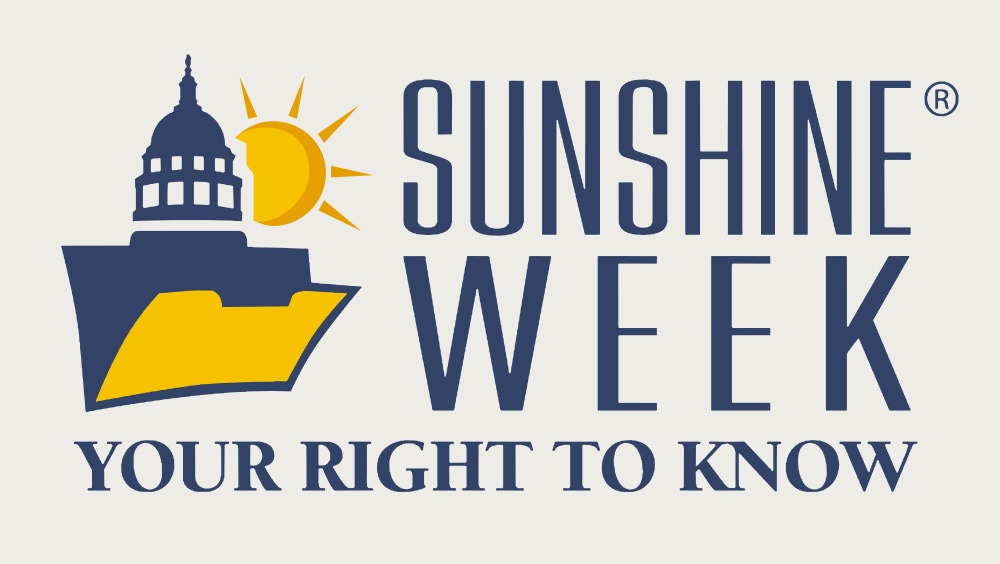Sunshine Week: Support Your Local Journalists

Sunshine Week is March 10-16, and this year, there’s an even greater need for you to get involved.
Sunshine Week annually celebrates freedom of information laws in every state. It also salutes efforts by good government advocates and journalists to use and ensure the effectiveness of those laws to get the information we need as self-governing citizens.
The name is a play on the commonsense words spoken more than a century ago by U.S. Supreme Court Justice Louis Brandeis, that “Sunlight is said to be the best of disinfectants.”
Brandeis’ remark was not made in a court opinion. It was in a 1913 article published in the news magazine Harper’s Weekly. Along with its observations on American culture and events, Harper’s was part of the “muckraking” news era, with journalists holding business and government accountable for corruption, waste and illegal activity.
As a special treat of each Sunshine Week, we get to see current examples of news reporting on behalf of the public, the type of journalism that the nation’s founders had in mind when they adopted strong First Amendment protection for a free press.
Sunshine Week was started in 2005 by the American Society of News Editors. The Joseph L. Brechner Freedom of Information Project at the University of Florida College of Journalism and Communications is coordinating Sunshine Week for the first time this year.
Each year, we celebrate the thousands of local, state and national print, TV, radio and online reports that tell us what the government or others are doing and how they are doing it; reports that explore and expose otherwise-unseen information we need to know to make good decisions at the ballot box, when petitioning for change or simply things we should know about our communities.
Just a few examples, from a 2023 New York Times report:
- In the Hunter Hills neighborhood of Atlanta, idle freight trains blocked a main road, sometimes for more than 30 hours, potentially blocking ambulances and fire trucks.
- In Colorado, a libertarian “food freedom” movement has re-energized a long battle over the safety of unpasteurized milk.
- A city manager in DuBois, Pennsylvania, gave himself raises and allegedly took hundreds of thousands of taxpayer dollars.
- After bus issues caused school closures in Jefferson County, Kentucky, two reporters followed one school bus trying to complete an impossible route.
- An investigative report of wage theft in New York State uncovered rampant abuse in the horse racing industry, with repeat offenders owing workers more than $4.4 million.
But this year as we celebrate that work being done on behalf of democracy, there is an increasingly needed partner in that work: You and your support for local journalists.
The number of journalists continues to plummet, from more than 75,000 newsroom jobs in 2005 to 31,860 in 2022, according to the Medill Local News Initiative. Far too many of us now live in “news deserts,” areas across the nation where not a single news outlet exists. Medill reported that in 2023, that out of 3,143 counties nationwide, 204 counties had no newspapers, local digital sites, public radio newsrooms or ethnic publications, and another 228 counties were at substantial risk of losing all local news media.
Even where there are established news media outlets, economic pressures have resulted in staff cuts that mean there is less coverage of local government institutions like the city council, school board and local courts.
We need to face the fact that there just aren’t enough journalists to do the job of monitoring and reporting on government, business and others.
To be sure, journalists and free press advocates are working to cut those losses and to buttress the flow of information to the public. There are new projects to fund local reporting or produce statewide or local reports, including the American Journalism Project; the Indiana Local News Initiative; Signal, a nonprofit organization in Ohio; and Houston Landing, a recently launched Texas publication.
Student-operated news media at several universities are reporting on their communities as well as their campuses. Student journalists are sometimes providing the only full-time reporting in some communities. Innovative nonprofit statewide news operations such as Wisconsin Watch, South Dakota News Watch and The Maine Monitor report, investigate and examine issues in their states.
Among notable national efforts: Freedom Forum funds two reporters, in Tennessee and Florida, in partnership with Journalism Funding Partners, who are dedicated to the First Amendment beat. The Lenfest Institute for Journalism provides tools and resources for local journalism leaders. The Knight Foundation has been a longtime advocate and supporter of efforts to energize local news outlets and nonprofit journalism operations.
But even with all those long-term and new initiatives, more help is needed. Let’s turn again to Brandeis, who according to an article by the Sunlight Foundation in 2009, said in that Harper’s article, “The individual citizen must in some way collect and spread the information” through civic groups and the press, which he believed would lead to “remedial action.”
This does not necessarily mean filing a Freedom of Information request. There are ways to help hold government accountable beyond this direct action.
Whether you are red or blue, progressive or conservative, Democrat, Republican or independent, you need to support those who do that investigative work on a daily basis.
Get behind and get engaged with those who use FOI laws and shoe-leather journalism to bring you the facts required for real self-governance. Take that information and make up your own minds about the concerns of the day where you live – and perhaps give the national pundit class a rest.
Open your eyes, your minds – and, yes, perhaps your wallets too – and bring a little sunlight into your life. Celebrate Sunshine Week. Justice Brandeis would be pleased, and you and your fellow citizens will be better off for the effort.
Gene Policinski is a veteran multimedia journalist and First Amendment advocate. He is one of the founding editors of USA TODAY and is senior fellow for the First Amendment at Freedom Forum.
Where America Stands on the First Amendment: By the Numbers
Related Content

